
Great to be back in Kariba despite the 40oC plus temperatures, in fact, 44oC the one day. Although up on last year, the lake level is still fairly low, leaving a large grazing area between the shore and the tree line. Our boat captain, Linkson, informed me the lake appeared to have dropped very rapidly in the past week. Why, I wonder? As usual, the icons of Kariba are ever-present in the form of Fish Eagles and their call, conspicuous in their numbers, Egyptian Geese, always raucous and harassing each other, elephants, impala, hippo in every bay and the ever-present lurking crocodiles on the lookout for an easy meal. In the silence of the night, the roar of lions and calls of the hyena in the distance. Magic.
I should mention the night before departure to Kariba we had a lovely dinner with our old friends Fiona and David Irvine hosted by our friends Joey and Wayne Marais. My friendship with the Irvine family goes back some forty years from when I first met the now late Bill and his son Sandy who I have previously mentioned. Bill, a canny old Scotsman, the founder of the household name Irvine's producing poultry products in Zimbabwe. Bill held Ministerial posts both in the pre and post-independent Governments. His son David has substantially increased the business while now in turn his son Craig, is making it trans-African. An old college friend, Jim Grey, who studied poultry at Auchincruive while I was there came out to work for the Irvines the same year I arrived in Rhodesia before becoming part of the family after marrying Bill’s daughter Mary.
I did enjoy a couple of Belvenis-after all it was my birthday. Thanks to all of you who sent me birthday wishes from around the world.
“The world we know and live in is not such a large place. How we live our life is the most limiting factor in its size to us as individuals.” - Peter McSporran
We are on the motor cruiser Manzi, skippered by Linkson assisted by the chef come deckhand Shorty (who is not short). A monohull of some 22 tonnes licenced and with accommodation for 10 passengers. Being only three, we have plenty of room with the full attention of the crew who have been excellent in their service and taking us to good fishing spots. With a plunge pool on the back for relief from the constant heat and ice-cold drinks, who could want for more? Heaven on earth for me, but too hot for Rozanne.
“If heaven (if it exists) is any better than having sundowners on a balmy evening on Lake Kariba, it must be a helluva place!” - Peter McSporran
October was always known as “suicide month” in Rhodesia because of the heat, no different now it is Zimbabwe. It is the beginning of the annual waiting game, waiting for the rains. Rain comes to this part of Africa each year as the inter-tropical convergence zone moves south. The grass is brown and sparse, the hippos have to travel far from the water for grazing while the other land animals search the parched ground for a green morsel on the water’s edge. No sign of rain yet as the impala normally drop their fawns three weeks before its arrival. None to be seen. Two marvels, how can impala extend the gestation period to just before the rains and how do they know it is going to rain in three weeks? And should the rains fail, they can also abort or re-absorb the foetus.

On Kariba, the fishing is the icing on the cake, with the spectacular scenery and wildlife being what makes Kariba so unique. As named in the book, “A Wilderness Called Kariba” so aptly. We concentrated mostly on bream although I did try for Tiger without luck while landing a couple of Barbel (catfish) and one Vundu (giant catfish).
For bream fishing, the first thing is to chum a suitable spot. Here in Zimbabwe, they put those European carp fishermen to shame, not just a few pellets will do, half a 25 kg livestock feed block is optimum. Much of the indigenous bream which was caught in the past has been replaced by the escaped Niloticus (Nile Tilapia) from the fish farms or hybrids crossed with the indigenous tilapia. I am sure there must be plenty of normal indigenous bream around although from seeing what we caught, very few. We did catch some Largemouth and more numerous Threespot bream but generally, the Niloticus or its hybrid were prevalent. For us, this larger fish, no Dwarf Bream (the bane of every Kariba fisherman), ate our bait readily. Best bream fishing we have had for years. I pretend, to myself, more importantly, we are helping the environment by taking these invaders home to eat. Of course, we have been enjoying them for meals while we have had Squeakers and Kapenta for snacks.
“Not all introduced non-indigenous plants and animals become environmental hazards. Take Kapenta for instance, sardines from Lake Tanganyika. In Kariba, they have offered food to other fish, also to the now very prolific avian life around Kariba along with creating jobs harvesting them, providing protein to many who cannot afford meat. Not everything that is deemed bad is actually bad.” - Peter McSporran
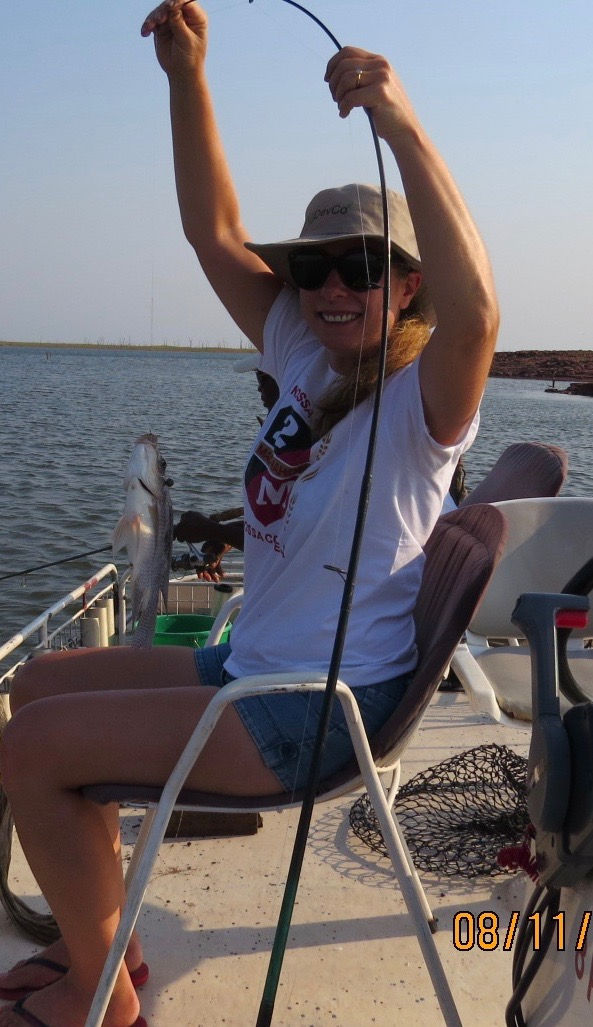
For those not from Zimbabwe, Squeakers are barbed fish that make a sound like a rusty hinge. They rub the spines of the pectoral fins into the grooves on the shoulders when caught. Further, they are armed with dangerous barbs like hooks making them extremely difficult to remove if they pierce you. Handle with care! Many years ago, I caught one of many while standing on the front of my boat. In my frustration, I decided I could get it off by hitting it against the tree we were moored to. Result, overshot tree, line wrapped around said tree with fish on the loop swinging with force, ensuring I was well and truly pegged in the leg. I am generally a slow learner but that time only one lesson was required.
Of course, the weather can be unpredictable and one night a very hot wind struck us causing chaos for a short while including breaking our mooring ropes. It also disturbed the sludge at the bottom of the diesel tank, giving myself and Linkson an hour of bleeding and cleaning the system before the engine would run. Never easy in a forty degree plus engine room at night. Much, I think, to my ex-farm managers’ surprise if they read this, as I was always loath to lift a spanner on the farm, more likely in the event to cause more harm than repair.
We have to drive the three hundred kilometres back to Harare to fly to Zambia today (Friday). Zimbabwe’s land borders are still closed due to Covid-19 restrictions but not the air borders. Obviously, Covid cannot fly!
By the way, we found the road from Harare to Kariba in pretty good condition, despite the dire warnings to the contrary.
“Harare is a city of rumours, the more negative the better. Fact is hard to find.” - Peter McSporran
Basic Training
Within a couple of days at Llewellin Barracks, a number of us were called on or volunteered for consideration. After the initial interview, along with a review of our exam results, both school and tertiary, we found ourselves in a group of about 40 tackling various obstacles, some impossible! One barrack-room friend spent a particularly long time swotting up chess moves for his interview as he had put down chess as one of his interests, although having played very little before. Perhaps he thought claiming to be a chess player would indicate he had strategic capability? Anyway, he must have learned enough as Jan van der Molen and I ended up coming out as sergeants rather than officers at the end of the course.
As I wrote, many of the obstacles that were set as tasks were impossible to complete. It was more about how you led your group in coming to a solution. While being stressful to the leader of each specific allocated ta
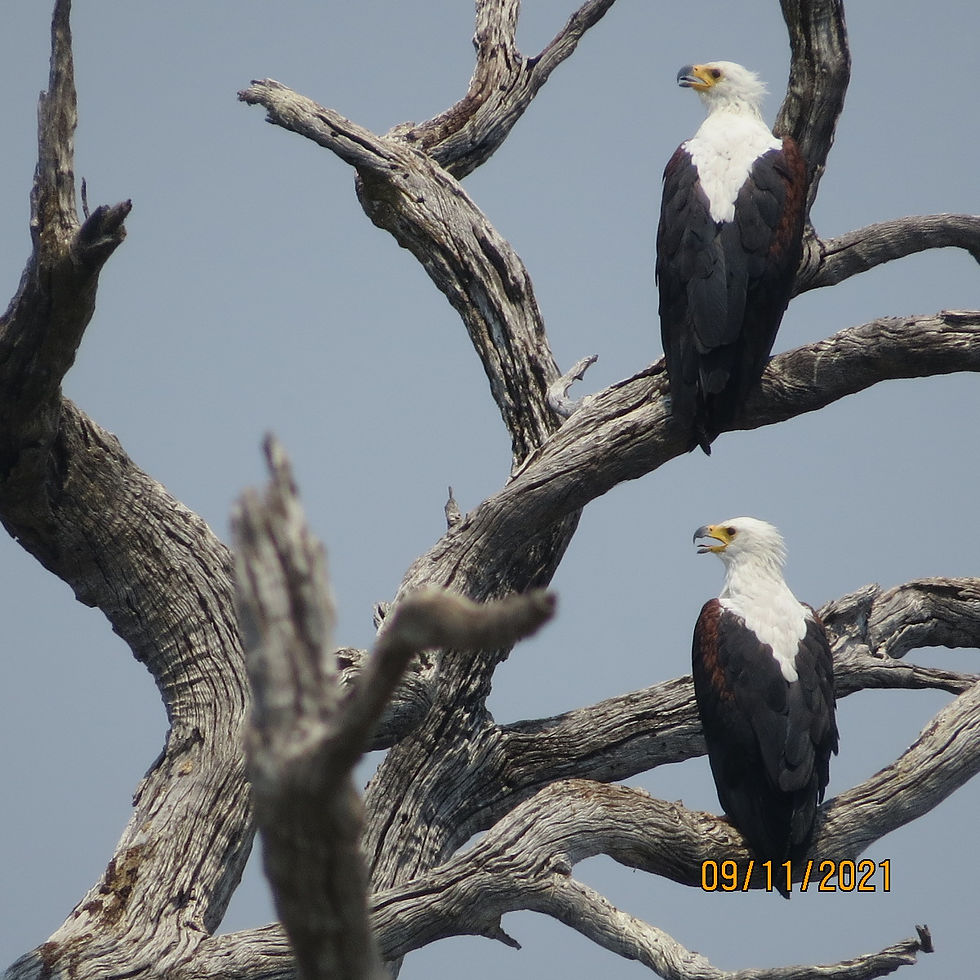
sk, for the rest of us waiting our turn at times it was hilarious. A sure way to get kicked off selection was to give up on a task or as the saying goes, “throw your toys out the cot.” They were looking at your aptitude, temperament and leadership skills. This was followed up with some essay writing, I wrote some bullshit about my upbringing on Mull, and there followed further interviews. Finally, about fifteen of us were selected to leave Llewellin, its cold barrack rooms and crazed corporals, to head for the School of Infantry in Gweru which was achieved one early frosty morning in the back of trucks, the good old petrol-guzzling RL’s.
Many of those not chosen would later join us once operational as corporals or other junior leaders, the backbone of the army in a guerrilla war having attended the junior leadership courses at Llewellin.
At the School of Inf. we were met by our course officer, Bruce Snelgar, a captain from the Rhodesian Light Infantry (RLI) already a decorated hero, who was to die in a helicopter crash later in the war. Our course instructor was Charlie Masson. Charlie was seconded from the SAS. Bruce turned out to be strict while extremely fair and a great example of how an officer should be. Luckily, he also had a wonderful sense of humour.
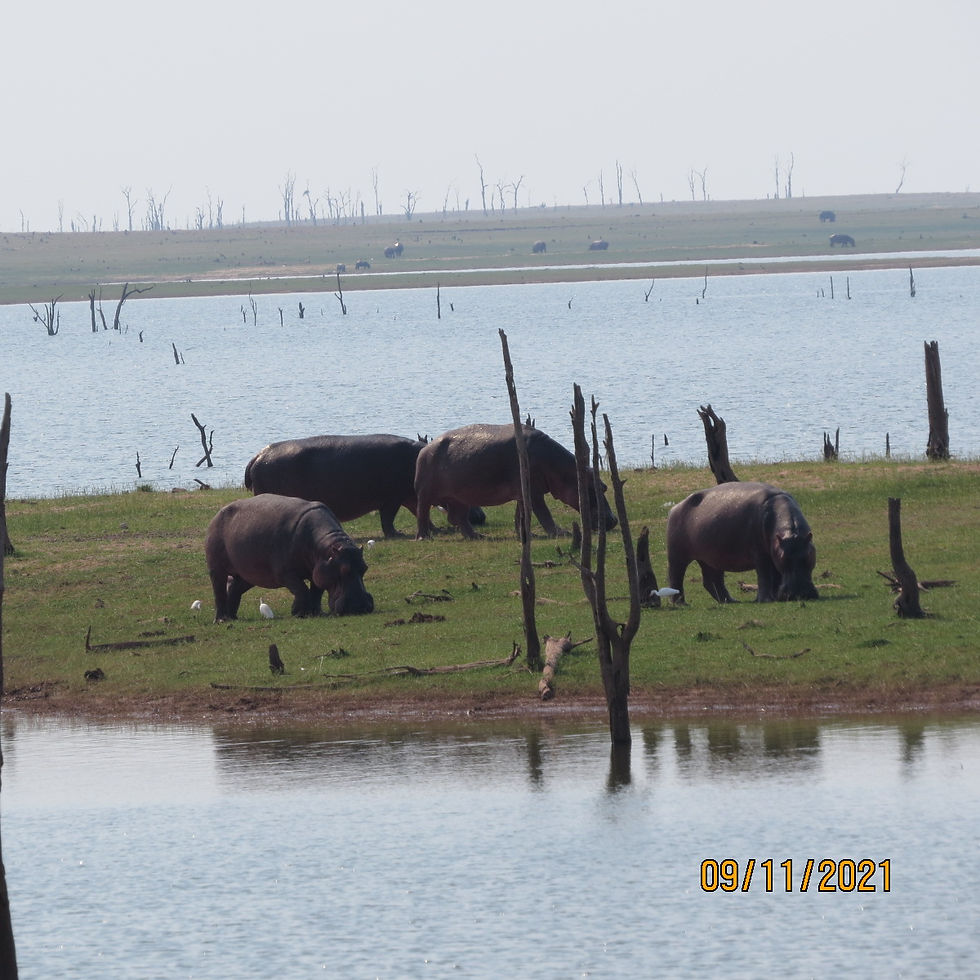
Charlie was an immaculate soldier with no sense of humour, at least none I could see. Always pristine, expecting us to mirror his turnout which we always failed to ensure his very short fuse igniting yet another verbal explosion directing us to carry out some arduous task. He was doing his job and took it seriously. Of course, we all thought too seriously at that time. Charlie was the one to meld us into a unit, eliminate those faltering physically, coupled with the continuous dress and barrack-room inspections to add mental stress. Kit inspections and dress inspections could happen day or night. In the army, they will inspect you for anything if they think they can find fault. The cadet wing Company Sergeant Major was Lou Hallamore, who became a renowned hunter. Another fair guy also RLI, whom we feared for his daily early morning roll calls and inspections. He also ensured we ate our daily Camaquin tablets without the aid of fluids. A bitter pill to swallow let alone chew which was the instruction on some days.
We were also told in the army it is, “hurry up and wait”. This came after basic training as it was hurry up, hurry up all the time. Sometimes it was the whole squad was deemed slow so we would be told to return to where we came from, be it the barrack-room or the drill square, the lecture to the assault course. On occasion, one person was deemed too slow, no matter what, the last person was always too slow, so we made every effort not to be last or within the last three. At times the whole squad would be punished for one person being too slow. We could be listening to instruction inside the lecture hall or on the training ground when we would be instructed to run around the outside perimeter of lecture rooms or to some distant tree. Unfortunately, there was a kopje, a small hill, close to the main gate of the barracks ideal to send your squad up with a gum pole for the added challenge while you have a not so quick fag. It was not long before some of us were returned to unit (RTU), suffering from chronic blisters or some other physical ailment, lack of willpower or malady brought about by the hard-physical regime.
The other place of physical and mental torture was the drill square. For most of the first six weeks, our attempts to keep in step, turn in the same direction and “dress” in a straight line defeated us. As for “about turns”, forget it. We were to learn that the hardest inspection to pass was the regimentals inspection every Monday morning undertaken by the Regimental Sergeant Major (RSM). He is the real leader in any army, officers who do not heed him will find life difficult. The outcome of failing the RSM’s inspection could bring about a miserable week, as your training staff treated your failures in smartness and drill as an affront to them in their capabilities in making us soldiers. Charlie used to start steaming as soon as the RSM found any fault. I am surprised he did not die on the parade ground, unfortunately, I believe he was killed later in the war.
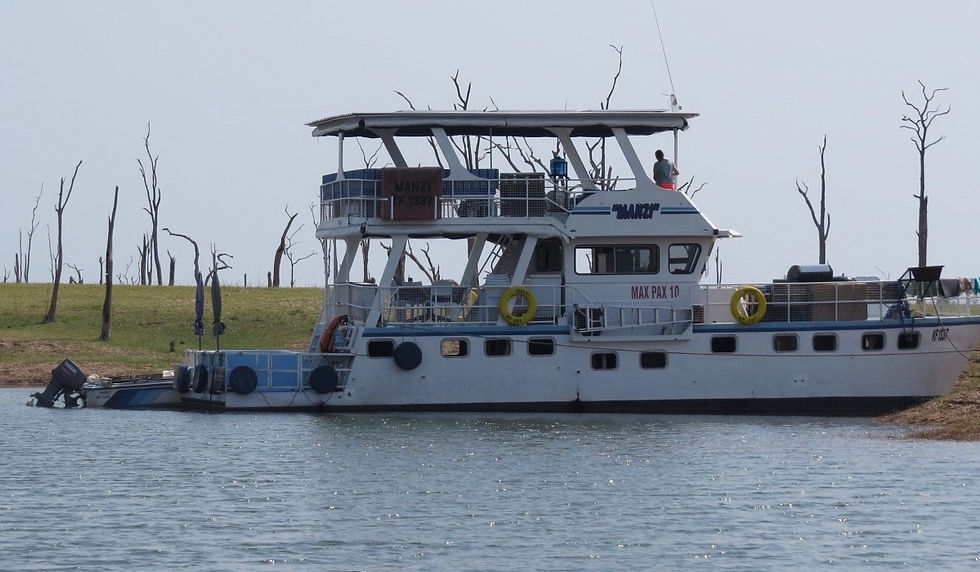
The carrot at the end of our basic training was that it coincided with the Rhodes and Founders long weekend. We had to meet the staff’s standards by then and achieve a final passing out at the end of basic training, which meant long nights “boning” boots, taking whatever sleep you could on the floor so as not to disturb our immaculate bed packs coupled with hours of drill. Of course, they pretended they did not know we slept on the floor, but to add difficulty they would call bed inspections with us in them, meaning hours of making the bed to the required standard for the next inspection. We used plywood in the blankets and pillows to make them as square as possible.
“In basic training at the School of Infantry sheets of discarded plywood became hallowed belongings you would fight to the death for.” - Peter McSporran
Lockers were another place where fault could be found. Any dirty clothes, you had to hide outside the barrack-room until washed as if found in your locker was a severe offence. Anyway, on the morning before Rhodes and Founders, it was announced all had passed except me. How bad I felt, only to learn at the last minute I was allowed to go off. I had a very depressive few hours as Janice’s parents, my girlfriend at the time, had offered to take me to Lake Kariba for the weekend. Was I to remain alone at the barracks? Just another of the army’s mind games. It was to be my first of many visits to the Lake, that time we had a very enjoyable stay at Kariba Breezes.

Traditional or Tribal Homelands, The Positives
In writing about the positive aspects of traditional, tribal or communal land, so many descriptions of basically the same thing, these may also be considered negatives. The negatives I will cover next week.
The main positive is, it gives the said African countries people’s a place they can call home. Many of those that migrate to the city for work live, if not in squalor, in very poor rented accommodation with families often sharing a single room. Having come from a village on traditional land gives everyone the ability to say my home, my Kamusha, home in Shona. Every indigenous African identifies with his specific area, tribe and totem. Having this stable known retreat gives the individual some comfort that there is always somewhere to return to either for retirement or reside if unable to find work. It also is somewhere you send your younger children to be brought up by grandparents or aunts, saving on expenses in family accommodation in town. Junior schooling is generally available in rural areas while many missions provide senior education. Mugabe benefited from a good Catholic Mission education. While claiming to be Christian, his actions always belied this. Rising populations are outstripping the demand for places with Governments struggling to offer alternate senior education for many.
Most rural areas are fairly tranquil except at times of civil, tribal or other conflicts. A peaceful place to be brought up where you are taught to respect your elders. Little drugs, other than marijuana. Certainly, no hard drugs or glue which is available at nearly every city street corner in Africa.
Many people survive in those rural homesteads mainly as subsistence farmers, hunters and gatherers although more difficult now as the rising populations are forcing them out of the slash and burn rotations that maintained some of the soil fertility.
The largest positive is probably that state governments know full well if survival is impossible during a person’s working life or on retirement he can return and survive in the rural areas on all that its flora and fauna can offer. Some are lucky enough to build houses during their working life, or if they have saved enough. The majority still live in rudimentary huts. The tribal home ensures that the extended family support survives through the generations although it is also being eroded as middle classes increase in Africa.
Needless to say, notwithstanding some challenges, if you can identify through your routes to a village in the rural areas there is still a good chance you will access some of the fast depleting often arid land for your elderly years.
This week the blog is relatively short, partly intentional as it is hard to write on Kariba with the heat, fishing, drinks and game viewing. I also thought I would have more pros for traditional land ownership.
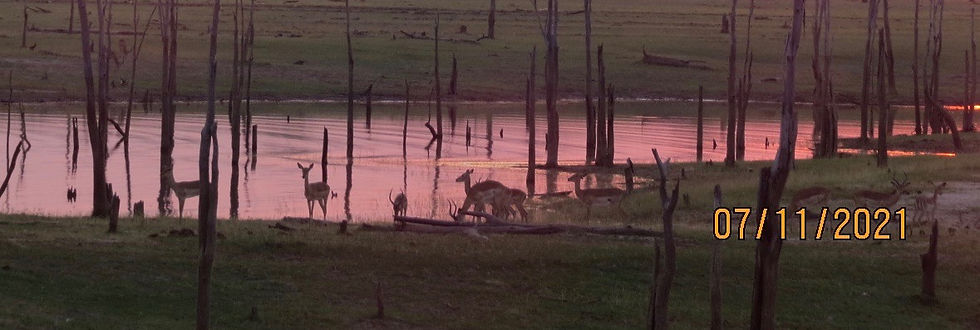
Disclaimer: Copyright Peter McSporran. The content in this blog represents my personal views and does not reflect corporate entities.
Comments